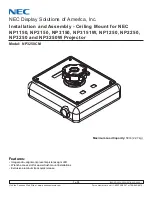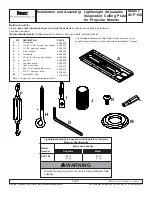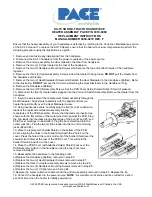
48716
Visit Rockler.com for the most current product
information and videos or call 1-800-260-9663.
Gold Plateau Pencil Preparation and Turning
© Rockler Companies Inc. 2014
Blank Preparation
1. Cut the blanks about 1/8" longer than the Brass Tubes to allow for
“blow-out” or hole elongation. Maintain grain orientation of the two
blanks for turning by placing an “x” on either side of the cut line.
2. Drill the blanks with an “O” drill bit at a speed of 900 to 1200 RPM.
3. Polish the Brass Tubes with 220 grit sandpaper to remove oxidation
and roughen the Tubes for better adhesion. This can be done by
hand or by chucking them in a drill press or portable hand drill.
4. Prepare to glue with medium CA (cyanoacrylate) glue or two-part
fast drying epoxy.
5. Apply the glue to the outside of one Brass Tube with a liberal amount
around the end that is inserted first. Do not apply glue to the inside
of the blank, as this will cause the glue to get inside the Brass
Tube and ruin it.
6. Insert the Brass Tube with a twisting motion into the blank until
the Tube is equidistant between both ends of the blank. Wipe off
any excess glue on the ends of the blank. Allow the glue to dry.
Glue the second Brass Tube using the same method.
7. Using a barrel trimmer, disk, or belt sander, trim the ends of the
blanks until you can just see the bright brass ends of the Tubes. The
faces of the ends must be perpendicular to the Brass Tubes and
parallel with each other. It is imperative to match the length of the
trimmed blanks to the original length of the Brass Tubes and that
the insides of the Brass Tubes are clean and free of any glue.
Turning the Blanks
1. Assemble the blanks on the mandrel with the bushings placed as
shown for Setup Part 1 above. Keep the grain orientation of the
blanks in line when mounting. Each bushing has a step that is
designed to be inserted into the Brass Tubes for stability while
turning, as the inner diameter of the tubes is larger than the mandrel.
Note:
The Center Band may be taped onto the Stepped Bushing and
used to test the fit of the turned tenon and the Lower blank.
2. At least 3/8" (9.5mm) of the Upper blank closest to the Stepped
Bushing at the center of the pen must be turned to a 12.7mm
diameter to match the outer diameter of the Center Ring.
3. An 1/16" portion of the Lower blank closest to the Stepped Bushing
must be turned to a diameter that will fit loosely inside the Center
Band (approximately 10.1mm). It may be helpful to stop the lathe
occasionally to test the fit. Make sure the Center Band has been
resecured before turning the lathe back on.
4. Stop the lathe and reassemble the blanks on the mandrel with the
bushings placed as shown for Setup Part 2 above. Keep the grain
orientation of the blanks in line when mounting. The rounded edge
of the Center Band should remain oriented toward the Nut of the
Mandrel. The Center Band should be secured before the lathe is
turned on.
5. Turn a tenon on the end of the Upper Tube nearest the Stepped
Bushing to match the inside diameter of the Center Band. Tenon
length should be 11/32" (8.7mm) and tenon diameter should be
13/32" (10.3mm). Take this cut a little at a time so that you do not
cut the tenon too small. Stop the lathe occasionally to test the fit with
the Center Band by trying to slide it over the tenon. The fit should be
snug. Make sure the Center Band has been resecured before turning
the lathe back on. The portion of the Upper blank nearest the
Stepped Bushing should be turned to the diameter of the Center
Band (approximately 13.6mm). Once the tenon has been cut, this
fit can be verified with the Center Band.
6. Turn the remaining portions of the blanks to the desired shape,
making sure the surfaces next to the end bushings are turned to
the same diameter as the bushings.
7. After turning, sand the surfaces in progressive steps of 220,
400, 600, and 1000 grit. If a higher finish is desired, micromesh
sandpaper may be used.
8. Apply the finish of choice and polish.
9. Remove the blanks from the mandrel, keeping the blank
orientation and grain patterns in line.
Upper Tube
Nut
Mandrel “A”
Plateau Bushing Set
Lower Tube
12.4 mm
12.4 mm
10.1 mm
10.1 mm
Center Band
Wood Spacer
Mandrel “A” Setup Part 1:
Tenon Section
Nut
Mandrel “A”
Plateau Bushing Set
12.4 mm
10.1 mm
12.4 mm
10.1 mm
Wood Spacer
Mandrel “A” Setup Part 2:
Upper Tube
Lower Tube
Center Band
Tenon Section




















